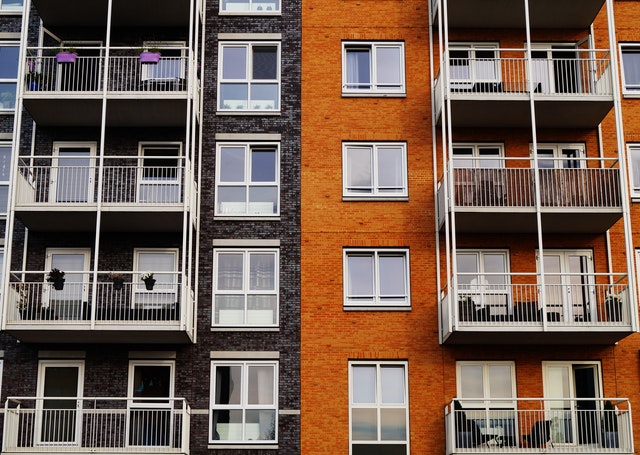If you’ve seen the property value of your rental property increase over the years or you’ve paid off a substantial amount of the property’s mortgage, you might be wondering if there’s a way you can tap into your equity without selling your property. One way investors can access their wealth of equity is through a cash-out refinance on rental property.
A cash-out refinance allows you to take out a new loan for a property for a larger amount than the previous loan amount. You then use the new loan to pay off the first loan. After closing costs and fees, the rest of the money ends up right in your pocket.
This can be a great way to access cash in order to pay down high interest debt or to continue building your rental property empire. However, you also have to be wary of the risks associated with a cash-out refinance. A larger loan amount will mean larger monthly payments, and you’ll want to make sure you will be able to meet your debt obligation even if you are met with vacancy or other setbacks.
Let’s take a look at everything you need to know about getting a cash-out refinance for a rental property to help you make a decision that best suits your financial needs and goals.

A cash-out refinance is when you replace an old mortgage with a new loan for a larger amount than you owed on the previous loan. This is one of the mortgage-refinancing options available to homeowners and property investors. By replacing the existing loan with a new, larger loan, owners and investors are able to take out additional cash that can be used for a wide variety of purposes.
There are a lot of different reasons that people might refinance a property. In general, refinancing is often used in order to achieve ends such as:
Cash-out refinance mortgages typically require a higher interest rate or more points at closing when compared to refinancing options where the loan amount doesn’t change.
How much cash you’re able to borrow through a cash-out refinance depends on a number of factors, including the bank’s criteria, your credit profile, and the loan-to-value ratio of the property.
When you do research about cash out refinances, it’s worth noting that most of the results will be about refinancing a primary residence. While you can certainly get a cash-out refinance for a rental property, there are specific considerations and differences you’ll want to be aware of.
Are you wondering how to calculate the value of a property based on its potential rental income? If so, check out this article for everything you need to know.

The basics of a cash-out refinance are the same for a rental property and a primary residence. When you get a cash-out refinance, you are taking out a larger loan than your existing loan. This new loan pays off the current mortgage first and then you receive the difference in cash. Of course, just like any other mortgage or refinance option, there will also be closing costs and additional fees to consider.
When you receive your cash from a cash-out refinance, there aren’t any restrictions on how you use the money. Some people might use a cash-out refinance as a lower-interest debt consolidation method, such as paying off personal loans or credit card debts using the cash. Real estate investors might access this cash in order to buy new properties or renovate an existing property.
While the process of getting a cash-out refinance for a rental property is similar to the process of getting one for a primary residence, there are three specific differences that you’ll want to be aware of.
In order to qualify for a cash-out refinance on a rental property, you usually need more than 25% equity and good credit.
Your existing loan balance and the current value of your home will determine how much equity you can cash out during a refinance. Usually, the maximum loan-to-value ratio (LTV) or investment property cash-out refinances are 75%.
This means that you will be required to leave at least 25% of your home equity right where it is. Basically, you’re probably going to need more than 25% equity in order to do a cash-out refinance. Before you start applying for new loans for your rental, you’ll want to run the numbers on how much cash you’ll need to keep in the property, how much it will cost to get a new loan, and whether it’s worth it for how much cash you’ll be able to take out of the equity.

As mentioned above, it can be more difficult to qualify for a cash-out refinance for a rental property than for a primary residence.
If you purchased your rental property with a mortgage, you are likely already aware of the fact that the process of getting a loan is more difficult for investment properties. This is generally because lenders see rental and investment properties as riskier than primary residences. After all, if a borrower gets into financial trouble, they will typically be more motivated to meet their primary residence loan obligation before rental property loan obligations.
Let’s take a look at what you’ll need in order to qualify for a rental property cash-out refinance. Remember, though, these are general guidelines and not strict rules. Each lender has its own criteria that they use in order to determine whether or not you are an eligible candidate for a loan. For this reason, it can be worth shopping around for a loan to a lender that’s willing to offer the best rates and terms.
In order to qualify for a cash-out refinance for a rental property, you’ll need to have adequate cash savings. The amount of savings you have does not include the amount of cash you’ll receive from refinancing.
How much cash you need to have saved up will depend on whether you own other properties and how much your new monthly mortgage payments will be. In general, you should expect that you will need cash saved up in the amount of anywhere from 0-12 months of future mortgage payments on the property.
Some lenders might also require that you have between 2 % and 6% of any unpaid loan balances on other properties you own (not including the property you are currently refinancing and your personal residence.)
When you’re getting a cash-out refinance loan for a primary residence, the minimum credit score is typically about 620. For a rental or investment property, though, the qualifications are stricter. While it can vary between lenders, don’t be surprised if lenders have a minimum credit score requirement as high as 680 or even 700.
If your credit score isn’t as high as you’d like it to be, you aren’t totally out of luck. However, you might need to shop around to find a lender that will accept a lower credit score. You should also expect that the trade-off will be less favorable interest rates and terms.
If you are planning on buying a beat-up rental property and fixing it up using a cash-out refinance, you’ll want to be aware of the waiting periods that often apply. Basically, you will need to endure what is known as a “seasoning period” before you can do a cash-out refinance.
Unless you fit within certain exceptions, you’ll need to wait at least six months before you do a cash-out refinance after the home sale closing. Some of the exceptions include:
You’ll also want to be aware that homes that were on the market within the last six months typically have a lower maximum loan to value ratio when it comes to cash-out refinances. These max out at 70% rather than the usual 75%.
Your eligibility for a cash-out refinance on an investment property is based in part on your loan-to-value ratio.
In order for a cash-out refinance to be worth it, you’ll need a substantial amount of equity in the home. Lenders commonly follow the LTV rules that are set by Freddie Mac and Fannie Mae.
You’ll want to shop around to find a lender that fits your needs. Not all lenders approve loans to both Freddie Mac and Fannie Mae standards, so you shouldn’t assume that the rates and terms one lender gives you will be the same for all other lenders.
It’s also possible to get a non-conforming or non-QM loan if you don’t qualify for a Fannie Mae or Freddie Mac loan. These lenders can be more lenient on credit scores, LTV, and more, but it can also mean less favorable terms and higher rates.
If you bought your investment property with a mortgage, you probably noticed that the interest rates were higher than for conventional, primary residence loans. The same is true when it comes to cash-out refinances on investment properties.
In general, the rates for investment property mortgages are about 0.5% to 0.75% higher than the rates for a primary residence. Cash-out refinance rates are generally higher than refinancing for the same loan amount because the lenders feel that it’s a riskier endeavor when a property owner takes equity out of a home.
In short, you should expect that the interest rates for a rental property cash-out refinance will be higher than for another type of refinance or if you were refinancing a primary residence. However, there can be a lot of variability between lenders. It’s generally recommended that you compare at least three to five different loan offers before choosing which lender you want to work with.
Though going through the loan application process with this many lenders can be time-consuming, it’s often worth it. By shopping around, you could potentially save thousands of dollars on the cost of your new loan over time.

If you need to borrow money and you have equity in your rental property, a cash-out refinance is certainly a reasonable option on the table. Depending on your circumstance, you might find that a cash-out refinance is easier to qualify for other types of loans, such as a personal loan. It also might be bundled with more appealing rates and terms than other loans you could take out.
If you use the cash to build, buy, or improve the property, you might also be able to deduct the mortgage interest from your taxes.
That being said, taking money out of your equity is always a risky endeavor. You’ll want to be certain that you will be able to keep up with the larger loan payments, otherwise, you could end up losing the rental property altogether. You’ll always want to weigh out whether the closing costs and potentially higher interest rates are worth it.
If you bought the property in cash, you might be able to qualify for an exception from the investor refinancing waiting period known as “delayed financing.” Since you didn’t use a loan to purchase the property, any loan you take out will technically be a cash-out loan.
Only you can decide whether you should refinance a rental property you bought with cash. There are strong proponents on both sides of the fence when it comes to whether or not you should use loans as leverage tools for building your rental property portfolio.
Are you shopping around for a cheap property and you’ve got your eye on the foreclosure listings? Before you show up to the auction, make sure you learn about the risks of buying foreclosed property.
If you decide that a cash-out refinance is the best option for you, here are the general steps you can expect to go through.
Building equity is the first step in refinancing your property. As we’ve mentioned above, the maximum loan to value ratio for investment properties is typically 75%. The more equity you have in your property, the more money you’ll be able to take out when you refinance.
There are a bunch of documents your lender is going to want to look at when you start refinancing. These include:
Dealing with lenders isn’t usually anyone’s idea of a good time. However, you can make the whole process go a lot more smoothly by collecting all of the proper documents ahead of time so you can easily send them over when the lender requests them.
Now that you’ve built up enough equity and gathered all of the documents you’ll need, you can start applying to lenders for a cash-out refinance. After you apply, do your best to respond to any inquiries you receive from lenders quickly. This way, you won’t have to deal with any unnecessary slowdowns in the process.
Again, it’s a good idea to apply to at least three to five different lenders when you’re looking for a cash-out refinance on a rental property. You can potentially save thousands of dollars over the life of the loan by shopping around.
It’s common to have the option to lock down your interest rate once a lender approves your application. This will give you a little bit of space to make a final decision and read through all of the refinancing terms without having to worry that your interest rate will go up.
The amount of time that rates lock for varies depending on the lender. However, it’s common for them to last anywhere between fifteen and sixty days. How long your rate lock lasts can also depend on the type of loan you’re taking out and your location.
When you get a loan approval with an interest rate you’re happy with, you’ll want to go ahead and lock it in as soon as you can. You can choose to proceed with the loan without locking it in, but you’ll want to be aware that your interest rate can change with the market rates.
Once you’ve found a cash-out refinance loan that works for you, the underwriting process will begin. At this time, lenders will work to verify the condition of the property as well as your income and assets. An appraisal will also be ordered, just like when you purchased the property in the first place (assuming that you did so with a mortgage.)
The appraisal will play a big role in how much money you’ll be able to take out in a cash-out refinance. After all, this is how the lender determines the fair market value of your property. Before the appraiser arrives, you’ll want to make sure the home is in the best possible condition, and feel free to share a list of upgrades you’ve made since purchasing the property.
Once the underwriting process is complete, you’ll be able to close on your cash-out refinance. Luckily, the amount of time between beginning a loan and closing on the loan is typically faster with refinances than with home purchases.
You will receive a document called the Closing Disclosure at least three business days before the closing. This will outline all of your new loan’s details. It will also include any fees or closing costs you will be expected to pay.
On the day of your closing, you’ll sign all of the final documents for your cash-out refinance. This is also an opportunity to ask any remaining questions you might have.
The money you are owed from your lender will usually show up in your bank account three to five days after the closing.
If you just bought a rental property and want to refinance, you usually have to wait six months before you can do so. However, there is an exception known as delayed financing which lets investors do a cash-out refinance just a few days after closing.
In order to qualify for this exception, the following rules must be met:
If you purchased your rental property with cash and you meet these other criteria, you might qualify for the delayed financing exception.
Are you trying to decide whether or not you should buy rental property? Check out these seven reasons you might not want to invest in rentals in 2022.
When you do a cash-out refinance on a rental property, it transforms your equity into liquid cash. You can use this cash for just about anything, but you’ll want to make sure you are using the money you take out in a way that benefits you financially. Remember, you’re taking out a larger loan amount than you previously had, which means your monthly mortgage payments will be larger than they were in the past.
Some of the things that you might choose to do with the cash from a cash-out refinance include:
As you can see, refinancing a rental property can open up a lot of potential to continue building and improving your rental property portfolio. It can also boost your overall financial health if you choose to use the cash to consolidate high-interest debt.
As with all things, there are equally compelling downsides to doing a cash-out refinance for a rental property.
First of all, you might find that interest rates have gone up since you initially took out a loan for the property, not to mention that interest rates for cash-out refinances tend to be higher than those for initial home loans and other types of refinances. Even though you can deduct your interest from your taxes, your cash flow can still be hurt by an increased interest rate.
Secondly, it’s important to take the closing costs into account when doing a refinance. There are high up-front costs to mortgage loans and refinancing. This is a real cost that shouldn’t be overlooked because depending on the cost of taking out a new loan and what you expect to do with the money you take out, refinancing might not always be as advantageous as it appears from the get-go.
Lastly, it’s important to understand that you risk foreclosure if you can’t pay back your monthly mortgage payments. When you get a cash-out refinance loan, it means that your monthly mortgage payments will be higher. You’ll want to run the numbers and make sure you’ll be able to float the mortgage even if something unexpected happens financially.
Depending on your financial goals, doing a cash-out refinance for a rental property can make a lot of sense. Whether you’ve built up a lot of equity through aggressive mortgage repayment, the passage of time, or through purchasing the property in cash, a cash-out refinance can give you access to money at a low-interest rate thanks to the property serving as collateral.
There are a lot of moving parts when it comes to rental property cash-out refinancing, though. Just like you did when you purchased the rental property, you’ll want to run the numbers to make sure that refinancing best serves your financial interests.
Are you looking for a calculator that helps you run through every possible scenario with your rental property? If so, you’ll definitely want to check out the most advanced rental property calculator on the internet.
We encourage you to share this article on Twitter and Facebook. Just click those two links - you'll see why.
It's important to share the news to spread the truth. Most people won't.